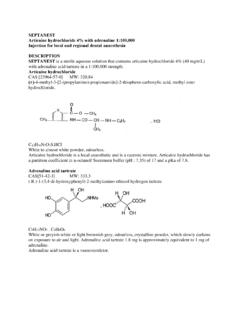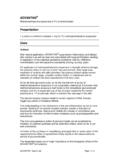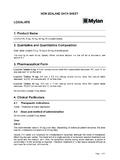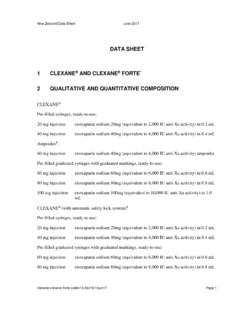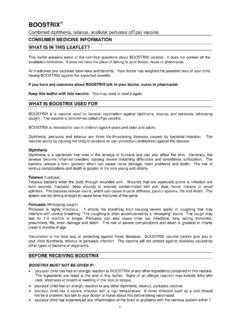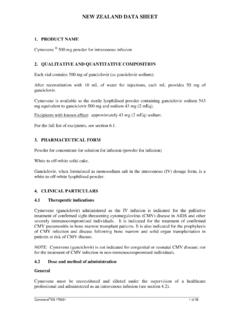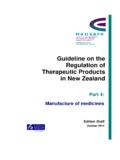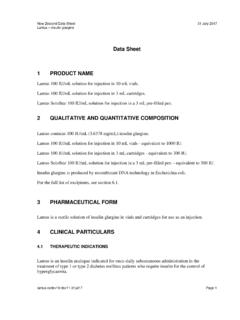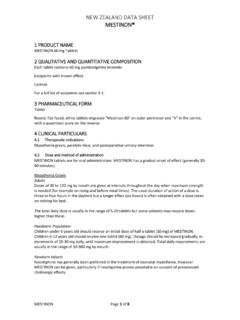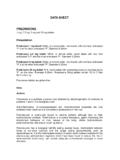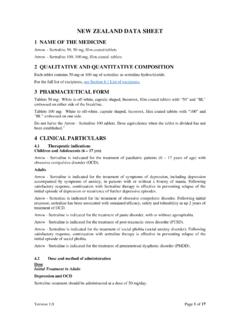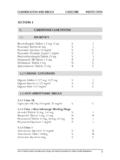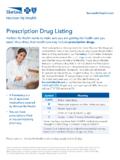Transcription of Ritalin tablet - Medsafe
1 Ritalin tablets 1 Ritalin tablet methylphenidate hydrochloride 10 mg immediate release tablets SR 20 mg slow release tablets _____ Consumer Medicine Information What is in this leaflet This leaflet answers some common questions about Ritalin tablets . It does not contain all the available information. It does not take the place of talking to your doctor or pharmacist. The information in this leaflet was last updated on the date listed on the final page. More recent information on the medicine may be available. You should ensure that you speak to your pharmacist or doctor to obtain the most up to date information on the medicine. You can also download the most up to date leaflet from Those updates may contain important information about the medicine and its use of which you should be aware.
2 All medicines have risks and benefits. Your doctor has weighed the risks of you or your child taking this medicine against the benefits they expect it will provide. If you have any concerns about this medicine, ask your doctor or pharmacist. Keep this leaflet with the medicine. You may need to read it again. What Ritalin is used for Ritalin tablets contain the active ingredient methylphenidate hydrochloride . Methylphenidate hydrochloride is a central nervous system stimulant. Like all medicines containing central nervous system stimulants, Ritalin will be given to you only under close medical supervision and after diagnosis. Ritalin tablets have two uses. They are used to treat: Attention Deficit Hyperactivity Disorder (ADHD); and Narcolepsy Your doctor may have prescribed it for another purpose.
3 This medicine should not be used to prevent or treat normal fatigue. ADHD ADHD or hyperkinetic disorder is a behavioural disorder in children, adolescents, and adults. About 3% of children suffer from ADHD, which makes them unable to sit still or concentrate on tasks for any length of time. They may have trouble learning and doing school work. They frequently become difficult to manage, both in school and at home. Ritalin is thought to work by regulating specific chemicals in the brain that affect behaviour. It helps to focus attention, shut out distraction and allows impulsive people to think before they act. If successful, it will enhance an inattentive person's natural ability. Ritalin is part of a treatment program which usually includes physiological, educational, and social therapy.
4 Narcolepsy Narcolepsy is a sleep-attack disorder. It is not a normal fatigue state. People with narcolepsy have recurring attacks of irresistible day-time sleepiness in spite of having enough sleep at night. It can be diagnosed by a doctor by recording wake-sleep patterns. Ask your doctor if you have any questions about why this medicine has been prescribed for you or your child. This medicine is only available with a doctor's prescription and your doctor has special permission to prescribe it. There is not enough information to recommend its use in children under 6 years old. Note: Ritalin is a controlled drug B2. It should be kept in a secure place and under no circumstances should it be given to anyone else.
5 Before you/your child take Ritalin When you must not take it Do not take Ritalin if you or your child are allergic (hypersensitive) Ritalin tablets 2 to methylphenidate (the active ingredient in Ritalin ) or to any of the other ingredients listed at the end of this leaflet. Some of the symptoms of an allergic reaction may include shortness of breath, wheezing or difficulty breathing; swelling of the face, lips, tongue or other parts of the body; rash, itching or hives on the skin. Do not take Ritalin if you or your child have any of the following medical conditions: periods of severe anxiety, tension or agitation Tourette s syndrome (a condition with uncontrolled speech and body movements or tics) or you have a family history of this disorder glaucoma (increased pressure in the eye) an overactive thyroid or other thyroid problems heart problems such as heart attack, irregular heartbeat, chest pain (angina), heart failure, heart disease or if you were born with a heart problem very high blood pressure (hypertension) or narrowing of the blood vessels (arterial occlusive disease, that can cause pain in the arms and legs)
6 Severe depression or other mental illness pheochromocytoma (a rare tumour of the adrenal gland, which sits near the kidney) If you are not sure whether any of the above medical conditions apply to you or your child, check with your doctor. Do not take Ritalin if you or your child are taking a medicine called a monoamine oxidase inhibitor (MAOI) or have been taking it within the past 14 days. Taking Ritalin together with MAOI medicines may cause a serious reaction with a sudden increase in body temperature, extremely high blood pressure and severe convulsions. Ask your doctor or pharmacist if you are not sure if you or your child have been taking one of these medicines. Do not take this medicine after the expiry date printed on the pack or if the packaging is torn or shows signs of tampering.
7 In that case, return it to your pharmacist. Before you/your child start to take it Tell your doctor if you or your child are allergic to any other medicines, foods, dyes or preservatives. Your doctor will want to know if you or your child are prone to allergies. Tell your doctor if you or your child have intolerance to lactose or gluten. This medicine contains lactose and wheat starch. Tell your doctor if you or your child have any of the following medical conditions or behaviours: any heart defects ( structural cardiac abnormality) a family history of sudden death or irregular heart beat hardening of the arteries any other current or previous heart problems any disorders of the blood vessels in the brain, weakening of the blood vessel (aneurysm), stroke, or inflammation of blood vessels (vasculitis) severe depression, bipolar disorder or other mental illness epilepsy (seizures, convulsions, or fits) high blood pressure history of alcohol or drug abuse or dependence tics (muscle twitching which is usually in the face or shoulders)
8 Or if your brothers or sisters have tics acute mental disorders that cause abnormal thinking and perceptions (psychosis) or feeling unusually excited, over-active and un-inhibited (acute mania) your doctor will have told you if you have this psychotic symptoms such as seeing or feeling things that are not really there (hallucinations) aggressive behaviour suicidal thoughts or behaviour. Your doctor may want to take special precautions if you or your child have any of the above conditions. Tell your doctor if you are pregnant or breast-feeding. Ask your doctor about the risks and benefits of taking Ritalin in this case. Ritalin is not to be used during pregnancy unless specifically prescribed by your doctor.
9 This medicine may affect your developing baby if you take it while you are pregnant. Do not breast-feed during treatment with Ritalin . The active ingredient in Ritalin can pass into the breast milk. Taking other medicines Tell your doctor if you or your child are taking any other medicines, including medicines that you buy without a prescription from a pharmacy, supermarket or health food shop. Some medicines and Ritalin may interfere with each other. These include: medicines that increase blood pressure alpha 2 agonists like clonidine (used to treat high blood pressure) oral anticoagulants or warfarin (medicines used to prevent blood clots) Ritalin tablets 3 some anticonvulsants (medicines used to treat epilepsy or fits) medicines used to treat depression, such as tricyclic antidepressants and monoamine oxidase inhibitors (MAO inhibitors) phenylbutazone (used to treat pain or fever) guanethidine anaesthetics medicines that influence the level of dopamine in the body (dopaminergic medicines used to treat Parkinson s disease or psychosis)
10 Medicines that raise the level of serotonin in the body (serotonergic medicines, for example those used to treat depression like sertraline and venlafaxine). You or your child may need to take different amounts of your medicines or you or your child may need to take different medicines. Your doctor and pharmacist have more information. If you have not told your doctor about any of these things, tell him/her before you or your child start taking this medicine. Your doctor and pharmacist have more information on medicines to be careful with or avoid while taking Ritalin . How to take Ritalin Follow all directions given to you by your doctor and pharmacist carefully. They may differ from the information contained in this leaflet.
